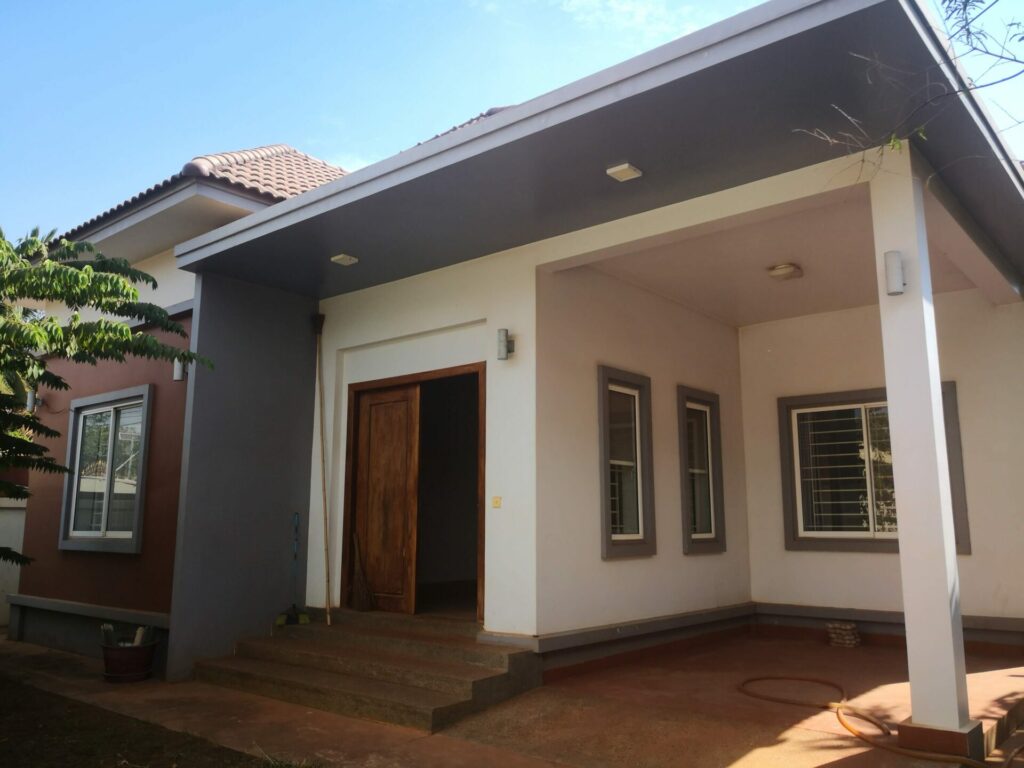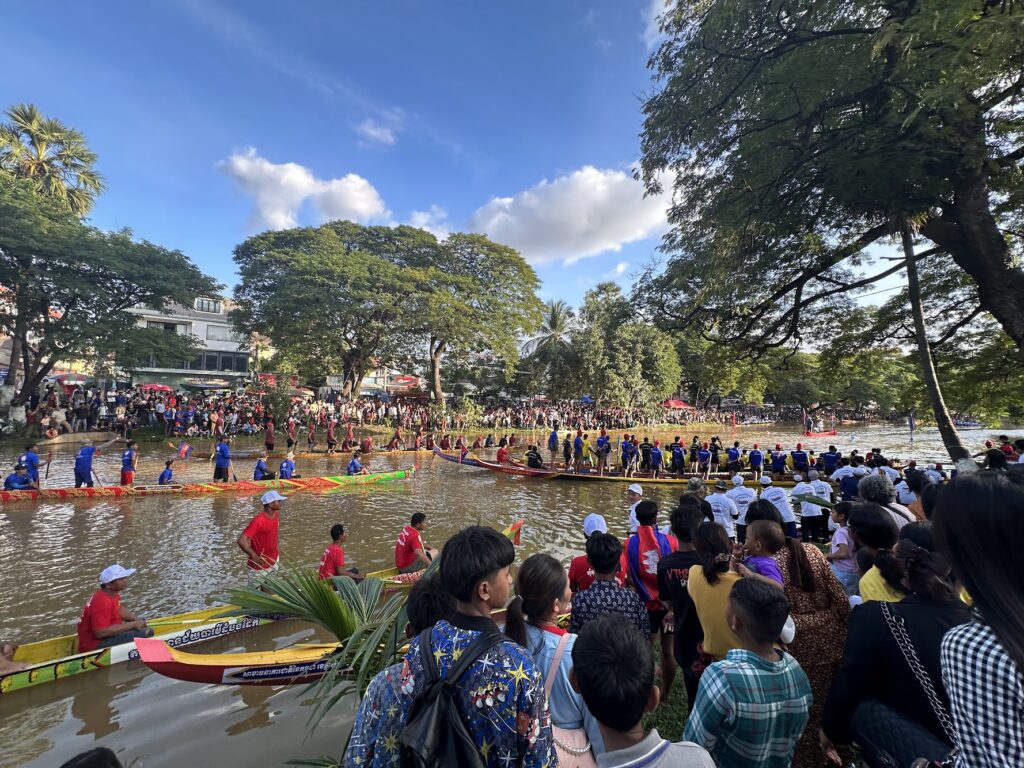The costs of living and care for elderly persons in many Western countries are rising. Many older people from Western countries choose to retire abroad due to the high cost of living in their home countries. In places like the United States, Canada, or Western Europe, housing, healthcare, and daily expenses can significantly strain a fixed retirement income. By moving to countries with lower living costs, such as in Southeast Asia, Central America, or Southern Europe, retirees can often enjoy a more comfortable lifestyle while stretching their savings. Access to affordable, high-quality healthcare in many of these destinations further enhances their appeal. One destination is particularly on the rise: Siem Reap in Cambodia, home of the famous Angkor Wat complex.

But Siem Reap is much more than a popular tourist destination. It’s an ideal place to retire. Many Western retirees are drawn to warmer climates, slower-paced cultures, and scenic environments that offer a sense of tranquility. If you are considering moving and retiring in Siem Reap, here is a comprehensive guide for beginners:
Guide for Moving to Siem Reap
Moving to Siem Reap is actually quite easy. People over the age of 55 can apply for a retirement visa, real estate companies assist you with finding the right place, and moving companies work with international freight forwarders. The best ways to get into Cambodia are:
Transportation Options
- By land: From Vietnam in Bavet or from Thailand in Poipet
- By air: More flights are available to Phnom Penh, from where you can take the Virak Buntham bus to Siem Reap in 5 hours
The new Siem Reap International Airport (SAI) is around one hour outside the city and has few international flights. However, it is well-connected to Bangkok’s airports. You can take a bus or shuttle to get into Siem Reap ($8) or use a private taxi ($35).
Visa Requirements for Retiring in Siem Reap
Cambodia offers a hassle-free retirement visa. Conditions are:
- You must be 55 or older
- You must be unemployed (and will not be allowed to work in Cambodia)
How to Get a Retirement Visa:
- Apply for a regular E-class visa at the Cambodian embassy or online
- Select the Type-ER Retirement Visa option
- Upload the required documents and pay the fees
- Receive an approval letter within 1–3 business days
- Upon arrival in Cambodia, extend your visa at the Immigration Department of the Cambodian National Police
The documents needed are:
A passport with at least six months of validity
A blank passport page for the visa
A passport-sized photo
Costs for a visa are around $300 per year. It needed to be renewed yearly.
Pro Tip: It’s much easier to use a professional service for the visa extension. We strongly recommend Consultancy Cambodia (+855 88 763 6678), who are experienced and trustworthy.
Housing Options for Retirees in Siem Reap
Living in Siem Reap is very cheap compared to Western countries and Asian capitals like Bangkok or Phnom Penh. You can choose between apartments (many newly built, with or without daily cleaning service) and houses.

Rental Prices
- House rents: From $250 for a simple one-bedroom to $800+ for larger homes with gardens and pools
- Apartments: Usually start from $300, depending on interior and service level
The housing market has an oversupply with constant movement. It’s best to arrive in Siem Reap, stay at a hotel for a few days, and connect with a real estate company. Most houses and apartments are ready to move in.
Recommended Real Estate Companies
- IPS Cambodia: Siem Reap branch of a major foreign-focused real estate company
- Dhaka Kun Real Estate: Specialized in Siem Reap properties
- Da Best Properties: Experienced staff with multiple location options
Advice: Plan a full day or two for house hunting, and it’s acceptable to use two agencies simultaneously.
Recommended Areas:
- Salakamreuk
- Sla Kram
- Svay Dankum
Healthcare in Siem Reap
As you age, healthcare becomes increasingly important. Siem Reap offers basic healthcare with several medical facilities:
Hospitals and Medical Centers

- Royal Angkor Hospital (International)
- Angkor Japan Friendship Hospital
- Neak Tep Hospital
These institutions can handle most medical cases, from flu to internal medicine, broken bones, and most chronic diseases. For more advanced medical issues, Bangkok is just a one-hour flight away.
Siem Reap also has a few physiotherapists. Pharmacies do have most western medication available over the counter. We recommend Pharmacy Kravvan near Wat Damnak and Preah Vihear pharmacy.
Important Notes:
- Hospitals typically require immediate payment
- Outpatient treatment is usually inexpensive
- Surgeries and hospital stays can be costly
- Check your health insurance carefully
- Forte Cambodia offers health insurance up to age 75 (around $5,000 per year)
Ambulance Service: Cambodia does not have an advanced ambulance service. Contact Royal Angkor or Neak Tep hospitals directly, as they have their own ambulances.
Care services: At Home Care Cambodia we offer affordable caregiving services by professionally trained staff. We speak English and Khmer and offer packages tailored to your needs, from hourly to weekly and monthly care. Contact us for inquiries at info@homecare-cambodia.com or +855 15 529224
Groceries and Shopping
Most locals still shop at fresh markets, which are great for fruits and vegetables. Be cautious of narrow and potentially slippery pathways.
Major Supermarkets

For meat and your Vegemite, Nutella or peanut butter better go to the supermarkets. They keep a good stock of western products as well as household goods. For shopping go to Ten11 or Zando, but be aware that they don’t have western brands and big sizes. Better option is to go on a shopping trip to either Bangkok or Phnom Penh.
Angkor Supermarket
- Largest selection
- Many Western brands
- Located on Road 6, near the National Museum
Chao San Hok
- Two outlets (Road 6 and Tep Vong Street)
- Some Western brands available
Asia Supermarket
- City center location on Sivutha Boulevard
- Convenient for downtown shopping
What to Do When Living in Siem Reap
Moving to Siem Reap for retirement means you’ll have more than just the famous temples of Angkor Wat to explore. Expats who live a minimum of 2 years in Cambodia get free entrance to these historical sites. For newcomers, the areas outside Angkor Thom and other temples are still free to explore – offering wonderful opportunities for walking or cycling through scenic forest landscapes.

Cycling in Siem Reap is particularly enjoyable. The city offers flat streets, picturesque rice fields, and relatively light traffic. The Siem Reap river provides an excellent route for morning or evening exercise, whether you prefer walking or cycling. The landscape is incredibly inviting for those who enjoy outdoor activities and want to stay active during retirement.
Leisure and Community Life
Some hotels offer creative perks for expats. The best current offer comes from Khmer House, which provides pool access for just $30 a month, while some establishments offer free pool access if you consume some food or drinks. This creates wonderful opportunities for socializing and staying cool in the tropical climate.

The local entertainment scene is surprisingly vibrant. Bars like Infusion, Bar 43, and Laundry Bar regularly feature live music, creating spaces for social interaction and enjoyment. Art galleries in the area host rotating exhibitions, providing cultural stimulation for those interested in the local arts scene.
Key local events mark the annual calendar, including the Water Festival in November and Khmer New Year in April. These celebrations offer excellent opportunities to immerse yourself in local culture and meet both expats and locals.

For those wanting to meet fellow expats, the areas from Soksan Road to Wat Bo Road are ideal. Sports enthusiasts will appreciate that many venues show US, European, and Australian events, even during night hours. While Pub Street remains a tourist hotspot, most experienced expats tend to avoid it, preferring more authentic local experiences.
Additional Activities and Experiences
The newly built Wildlife Center and aquarium offer interesting day trips. For those eager to understand local culture more deeply, we recommend booking a cooking class with “Dine With The Locals” – an excellent way to learn about Cambodian cuisine and interact with local community members.

Fitness enthusiasts will find several gyms in Siem Reap, some with air conditioning and many without. For those with mobility challenges, transportation is easily managed. You can book a rickshaw through PassApp or Grab, or consider the recently introduced small electric 3 and 4-wheel scooters that provide increased mobility and independence.
The Expat Community: Diversity and Connection
The expat community in Siem Reap is wonderfully diverse and vibrant. Some retirees seek distance from their fellow countrymen, while others prefer to be surrounded by familiar faces. Siem Reap uniquely offers something for everyone.
You can easily meet people from your own country in various bars and restaurants, or broaden your horizons by attending community events that attract people from all over the world. For those truly eager to integrate, learning the local Khmer language provides endless opportunities to connect with locals. Even learning the language to a basic level can dramatically improve your understanding of the local culture and daily life.
This approach to language and community reflects the welcoming nature of Siem Reap. Whether you’re looking to maintain connections with fellow expats or deeply immerse yourself in local culture, the city provides multiple pathways to create a fulfilling retirement experience.
Language learning isn’t just about communication – it’s a gateway to understanding the nuanced cultural landscape of Cambodia. While many locals in Siem Reap speak some English, particularly in tourist and expat-friendly areas, investing time in learning Khmer can transform your retirement experience. Local language schools and conversation groups offer structured and informal learning opportunities, making the process both educational and social.
The diversity of the expat community is remarkable. You’ll encounter retirees from Australia, the United States, various European countries, and other parts of Asia. Regular meetups, community events, and informal gatherings provide numerous opportunities to build friendships and support networks. Some expats organize book clubs, walking groups, volunteer activities, and cultural exchange events that help newcomers integrate smoothly into the local environment.
Safety in Siem Reap
Siem Reap stands out as remarkably safe compared to many other Asian cities, and particularly when contrasted with Cambodia’s capital, Phnom Penh. Walking around in the evening is generally considered safe, with low incidents of serious crime. Pickpocketing and break-ins are far less common than in typical tourist destinations, and robberies are essentially unknown.
Local police actively maintain city safety, with most criminal activities confined within the local community. The occasional crime involving foreigners tends to be minor – typically something like forgetting to pay a bar or hotel bill. This low-stress environment contributes significantly to the appeal of Siem Reap for retirees seeking a peaceful lifestyle.
The sense of community and mutual respect plays a crucial role in maintaining this safe environment. Locals are generally welcoming to foreigners, and the small-town atmosphere of Siem Reap creates a sense of collective responsibility for community safety.
Financial Considerations Beyond Housing and Visa
While the initial sections covered basic living costs and visa requirements, it’s important to delve deeper into the financial landscape for retirees. Cambodia’s economic structure offers several advantages for expatriates.
The cost of living remains significantly lower than in Western countries. Beyond housing, everyday expenses like dining out, local transportation, and personal services are remarkably affordable. A typical meal at a local restaurant might cost between $2-$5, while a good restaurant meal could range from $10-$15. Local markets offer incredibly cheap fresh produce, allowing retirees to maintain a high-quality diet at a fraction of Western prices.
Banking and Financial Management
Most international banks have relationships with Cambodian financial institutions, making money transfers relatively straightforward. However, it’s advisable to:
- Maintain a bank account in your home country
- Use international banking services with low transfer fees
- Consider local bank accounts for day-to-day expenses. Recommended are ABA, ACLEDA and BRED Bank.
- Keep multiple payment methods available: Khmer Riel is common for most purchases as well as QR code payment with local bank accounts.
Technology and Connectivity
Despite being a relatively small city, Siem Reap offers surprisingly good technological infrastructure. High-speed internet is widely available, with many cafes, restaurants, and residential areas offering reliable Wi-Fi. Mobile data plans are affordable, and 4G coverage is extensive. SMART, CELLCARD and Metfone are the leading providers.
Environmental and Climate Considerations
Siem Reap’s tropical climate offers warm temperatures year-round, which appeals to many retirees from colder regions. The year is divided into two primary seasons:
- Dry season (November to April): Warm and sunny
- Wet season (May to October): Regular rainfall with lush, green landscapes
While the heat can be intense, most modern housing and many public spaces are equipped with air conditioning. The surrounding natural beauty – rice fields, tropical forests, and scenic rivers – more than compensates for occasional climatic challenges.
Conclusion: Thats why we recommend to retire in Siem Reap
Siem Reap offers retirees from Western countries an extraordinary blend of affordability, cultural richness, and quality of life that is increasingly difficult to find elsewhere in the world. The city presents a compelling alternative to traditional retirement destinations, combining practical benefits with deeply meaningful experiences. From the awe-inspiring temples of Angkor Wat to the warm, welcoming local community, Siem Reap provides a unique environment where retirees can reimagine their golden years. The combination of low living costs, accessible healthcare, vibrant expat community, and rich cultural landscape creates a retirement opportunity that goes far beyond mere geographic relocation – it represents a genuine lifestyle transformation.
Beyond the practical advantages, Siem Reap offers something more profound: a chance to live differently, to embrace a slower, more intentional way of life. Here, retirees can escape the economic pressures and social constraints of their home countries, finding instead a world of personal discovery, cultural immersion, and unexpected adventures. The city’s safety, affordability, and welcoming atmosphere provide not just a place to retire, but a genuine opportunity to start a new chapter of life. Whether you’re seeking to stretch your retirement savings, explore a rich and ancient culture, make new international friendships, or simply experience a different way of living, Siem Reap stands as a beacon of possibility, inviting those with a sense of adventure to write their next life story in this remarkable Cambodian city.

Leave a Reply